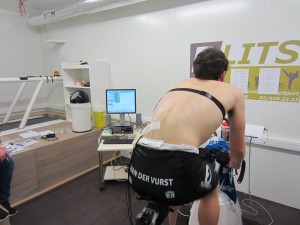Thermoregulation, fatigue and brain neurotransmission during prolonged exercise in normal and high ambient temperatures.

In exercise physiology, fatigue has traditionally been defined as an acute impairment of exercise performance that leads to an inability to produce maximal force output possibly due to metabolite accumulation or substrate depletion. However, fatigue will not only occur at the peripheral level, since there is ample evidence that mechanisms within the CNS are also implicated in the genesis of fatigue. It is obvious that the ‘perception’ of fatigue is processed at the central level, and that cerebral metabolism and neurohumoral or neurotransmitter responses during exercise can be disturbed, leading to fatigue. It therefore appears that many parameters affect the capacity to ‘perform’ during exercise and each will depend on the type of exercise, the duration of exercise and on environmental factors. The monoamines serotonin, dopamine and noradrenaline play a key role in signal transduction between neurons, and exercise-induced changes in the concentrations of these neurotransmitters (especially serotonin and dopamine) have been linked to central fatigue.
The research line ‘Central Fatigue’ is ongoing in our lab for over 15 years now. We studied the effects of the manipulation of different neurotransmitter systems (through the administration medication that inhibits the reuptake of dopamine, noradrenaline or serotonin) in normal ambient temperature (18°C). This elicited little differences in performance.
We then postulated that the combination of exercise and the manipulation of central neurotransmission in the heat may elucidate the mechanisms of fatigue. Indeed, from these studies – and in contrast to pharmacological manipulations in normal ambient temperature - it was shown that a dopamine-noradrenaline reuptake inhibitor as a dopamine reuptake inhibitor significantly enhanced performance, coinciding with the attainment of high core temperatures and higher heart rates, without any change in thermosensation or the perception of effort. It seems that the safety mechanisms in the body are overridden, specifically due to increased dopaminergic activity. Increased brain concentration of noradrenaline strongly decreased performance and no effect of serotonin could be detected. These studies elucidated that specifically dopamine and noradrenaline exert important roles in the onset of fatigue during prolonged exercise.
In a follow-up phase we investigated the effects of the same manipulations through electrophysiological measures, using transcranial magnetic stimulation. This method allows us to determine the origin of fatigue in a more precise manner. The first findings show a clear involvement of the brain in the onset of fatigue. This research line runs together with the lab of prof Duchateau of the Université Libre de Bruxelles.
Recently we developed a new research line in which we are looking at the impact of mental fatigue on a physical performance. This topic has gained interest over the last years and the first results point in the direction of clear negative effects of a mentally fatigued state on physical performance capacity. The aim of this research line is to examine the link between both forms of fatigue.
Author: Bart Roelands
« Back to overview